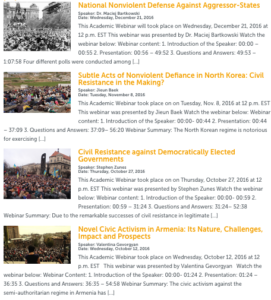CALL CLOSED
Deadline to apply is June 22, 2017, but we encourage earlier submissions.
 The International Center on Nonviolent Conflict welcomes the submission of presentation proposals for our Webinar Series on Civil Resistance* for Fall 2017 and Winter 2018. ICNC’s Webinars are a series of online talks and interactive discussions combined with individual or group presentations on critical ideas, cases, and questions related to civil resistance and nonviolent movements. Webinars are streamed live and the recordings are posted on ICNC’s website for future viewing.
The International Center on Nonviolent Conflict welcomes the submission of presentation proposals for our Webinar Series on Civil Resistance* for Fall 2017 and Winter 2018. ICNC’s Webinars are a series of online talks and interactive discussions combined with individual or group presentations on critical ideas, cases, and questions related to civil resistance and nonviolent movements. Webinars are streamed live and the recordings are posted on ICNC’s website for future viewing.
We particularly encourage the submission of webinar proposals that explore relatively under-discussed or under-researched topics on civil resistance and nonviolent movements and that bring an analysis and perspectives on nonviolent conflict informed directly by the field experience and/or voices of practitioners.
ICNC is interested in presentations that directly discuss ideas of civil resistance practice and scholarship.
ICNC offers a modest honorarium to webinar presenters that ranges between $200 to $400, depending on the number of presenters in a webinar and speakers’ experience.
Our Webinars are intended for scholars, activists, educators, members of the media, policy makers, practitioners, and students. Since the series began in 2010 we have reached thousands of participants from around the world.
Civil resistance is understood as a nonviolent struggle that civilians undertake using a range of nonviolent methods — including, but not limited to, marches, strikes, boycotts, noncooperation, civil disobedience, building alternative institutions — with the aim of winning human rights, establishing greater accountability, social justice, and more inclusive, nonviolent democratic spaces.
Prospective applicants are encouraged to review past ICNC Webinar recordings and the list of topics that are of interest to ICNC.
Past presentations, among others, included:
• Ches Thurber: “Civil Resistance in Divided Societies: Key Lessons from Nepal, South Africa, and East Timor”
• Sherri Mitchell and Tom Hastings: “Native Americans’ Nonviolent Struggle for Rights and Justice”
• Matthew Johnson: “Why did Occupy Stumble: Key Lessons for Activists Today”
• Erica Chenoweth: “Why Civil Resistance Works”
• Cynthia Boaz: “How the Media Misinterpret Nonviolent Struggles”
• Nadine Bloch: “Creative Cultural Resistance”
• Nada Alwadi: “Civil Resistance in Bahrain”
• Kurt Schock: “Civil Resistance and the Struggle for Land”
• Sharon Erickson Nepstad: “Why Nonviolent Revolutions Sometimes Fail”
• Oliver Kaplan: “Nonviolent Strategies to Avoid Civil War”
• Maciej Bartkowski: “Recovering Nonviolent History”
• Michael Davis and Victoria Hui: “The Umbrella Movement in Hong Kong”
• Véronique Dudouet: “Dynamics and Factors of Transition from Violence to Nonviolent Resistance”
• Webinar Discussions, “From Selma to St. Louis: Civil Resistance in Ferguson and Beyond”
• Webinar Discussions, “Ukrainian Struggle Explained”
• Webinar Discussions, “Anti-Corruption Struggles”
View full ICNC Webinar Digest with webinars delivered between 2010-2016 and check the website that list recordings of the past webinars up to May 2017.
Submit your webinar proposal here
List of topics of potential webinars that are of interest to ICNC:
- Formation of civil resistance movements
- Building coalitions and maintain unity during civil resistance struggles
- Sustaining civil resistance movements and developing movement resilience against repression
- Conceptual, organizational, normative, psychological basis for movement mobilization
- Different life cycles of civil resistance movements
- Leadership, organization, and decision-making processes inside civil resistance movements
- Maintenance of nonviolent discipline in civil resistance campaigns and violent flanks
- Civil resistance through building alternative self-organized economic, political, educational, or judicial systems and institutions
Impact of Civil Resistance
- The impact of civil resistance on different types of defections from business, religious, political and security establishments
- Short- and long-term impacts of civil resistance on society, politics, institutions
- The impact of civil resistance on identities, culture, and individual and collective behavior and aspirations
- Civil resistance and political transition processes
- Civil resistance and prevention of major atrocities
Different Types of Civil Resistance Struggles
- Popular grassroots movements on the margins (landless people, unemployed, underprivileged, indigenous people)
- Civil resistance to fight climate change
- National nonviolent defense against external violent threat
- Civil resistance in violent environments or in fragile states
- Civil resistance challenging violent non-state actors (e.g. organized criminal syndicates, paramilitary groups or violent extremists)
- Civil resistance against structural violence
- Civil resistance against corruption
- Civil resistance against abusive exploitation of natural resources
- Civil resistance movements that have not succeeded: lessons learned
- Nonviolent resistance to coups d’état
- Unknown or little-understood cases of civil resistance struggles in the past or recent history
Cross-Cutting Issues with Civil Resistance
- Civil resistance and negotiations
- Civil resistance and peacebuilding
- Civil resistance, prevention of mass atrocities or decreasing the likelihood of mass killings
- Civil resistance against violent extremism
- Civil resistance, new technologies and media
- Civil resistance and international human rights norms
- Gender and women in civil resistance movements
- Transition from violence to nonviolent resistance
- External parties (i.e. states, multilateral institutions, INGOs, international journalists, diaspora groups) and civil resistance campaigns
